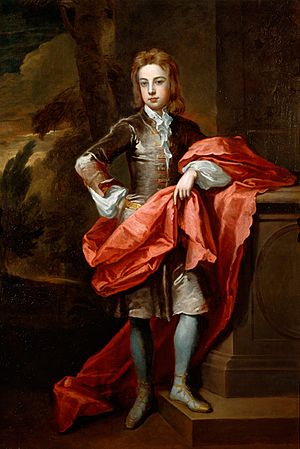James Vernon the Younger facts for kids
James Vernon the Younger was an important person in the British government a long time ago. He was born on June 15, 1677, and passed away on April 17, 1756. He worked as a government official, a diplomat (someone who represents their country), and a politician. He was a member of the Whig party. From 1708 to 1710, he was a Member of Parliament in the House of Commons. He also served as an envoy, or representative, for Britain in Denmark from 1702 to 1707.
Contents
Early Life and Education
James Vernon the Younger was the oldest son of James Vernon, who was also a politician. His mother was Mary Buck. His father was a very important government official called the Secretary of State for King William III.
James Vernon the Younger studied in the Netherlands. He attended schools in Utrecht in 1690, and then in Rotterdam from 1690 to 1692. He returned to Utrecht for more studies from 1696 to 1697.
Starting a Career in Government
In 1691, James Vernon got his first job in the government. He was appointed as a "serjeant of the chandlery." Later, in 1697, he became an extra clerk for the Privy Council. This was a group of advisors to the King.
He tried to become a Member of Parliament (MP) in 1698 but was not successful. From 1698 to 1700, he worked for the Duke of Gloucester. He became very ill while working for the Duke, who sadly passed away from the same illness. It took James several months to get better.
In 1701, he tried again to become an MP with his father, but they did not win. From 1701 to 1702, he was a Commissioner of the Privy Seal. In May 1702, he was chosen to be a Fellow of the Royal Society. This is a special group for important scientists.
Diplomat and Member of Parliament
James Vernon served as the British envoy to Denmark from 1702 to 1707. This meant he represented Britain in Denmark. At the same time, he also worked for the Prince of Denmark until 1708.
In the 1708 British general election, James Vernon was elected as a Whig Member of Parliament for Cricklade. In 1709, he supported a law to allow people from Palatine (a region in Germany) to become British citizens. In 1710, he voted to remove a preacher named Dr. Sacheverell from his position. James later said he was surprised that the Whig leaders made such a big deal about a "preacher much below their notice."
In 1710, he became a Commissioner for Excise. This job paid £800 a year. Because he took this government job, he could not run for Parliament in the 1710 British general election.
Later Life and Family
After 1710, James Vernon decided to focus on his government work rather than politics. He continued to serve the government even when a different political party, the Tories, was in charge.
In 1713, he married Arethusa Boyle. She was the daughter of Charles Boyle, Lord Clifford. When King George I became king in 1714, the Whigs were back in power. Because James had a Whig background, he kept his job. In 1715, he was also appointed as a Clerk of the Privy Council, a position he held for the rest of his life. In 1716, he was again a Commissioner of the Privy Seal.
He lost his job at the Excise in 1726 after a disagreement with a powerful politician named Walpole. However, he got the job back in 1728. In 1727, his father passed away, and James Vernon the Younger took over his family responsibilities.
James and Arethusa had children, including a son named Francis Vernon. Francis later became the 1st Earl of Shipbrook.
Charity and Final Years
James Vernon spent a lot of his time on religious and charity work. He helped start the colony of Georgia in America and was a trustee for Bray's charity, which helped people in need.
His government duties kept him in London. But by 1733, he bought a large estate in Great Thurlow, Suffolk, for £15,000. Later, he helped build workhouses in several towns in Suffolk. These places provided work and shelter for poor people.
James Vernon the Younger passed away on April 15 or 17, 1756. He was buried at Great Thurlow.
 | William L. Dawson |
 | W. E. B. Du Bois |
 | Harry Belafonte |


